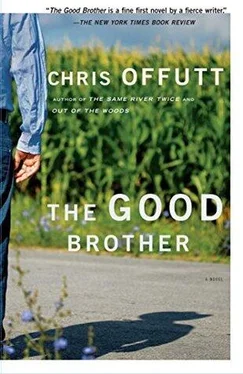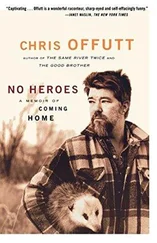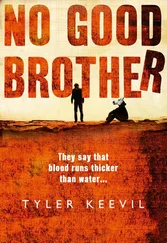He switched wallets, put the money in his pocket, and entered the terminal, curious as to why the doors were so tall. A man gave him a card that said he was deaf and mute and wanted money. Virgil looked at the man, thinking that such a malady was handy in a place as noisy as an airport. The man took the card back.
Virgil bought a newspaper and scanned the automobile ads. When he found one in his price range, he called for directions, walked to a taxi service, and asked for a ride to a town called Rabbit Hash. Having never ridden in a cab, Virgil hesitated at the door.
“Get in the front,” the driver said. “This ain’t no limo.”
Virgil climbed into the car.
“Just get out of the can?” the driver said.
“What?”
“Only guys I seen traveling light as you were convicts coming home,”
“Not me.”
“Hey, nothing personal. Just that you don’t look like a business traveler.”
“I got business in Rabbit Hash.” Virgil handed him the address. “See a man about a car there.”
They passed a hitchhiker leaning against his pack.
“Ever do that?” the driver said.
“Once.”
“It ain’t a good habit. I got picked up by a dude in a station wagon, man. Made me sit in the back seat. After a while I noticed my shoes were wet. Battery acid. Dude had about a hundred batteries in the back, leaking all over hell. He asked me if I knew any dirty jokes. I told a couple and the dude never laughed. All I could see were his eyes in the rearview mirror. They were bad-looking, man, like bum holes in leather. All of a sudden he pulled over and told me to get out. Last thing he said to me was, ‘Anybody knows jokes that good deserves to live,’ Two weeks later he was on TV getting arrested down in Missouri. He’d killed four hitchhikers. That’s when I started driving a cab. I ain’t been out of radio contact with the world since.”
Virgil nodded. The more he saw of the world outside of the hills, the less he desired contact.
They left the highway for neighborhoods that reminded him of Lexington, and he wondered if all cities were laid out in blocks. At home the roads ran beside creeks, while foot paths followed game trails. Without animals or water, the cities had no underlying sense of organization.
They reached the address, the last house on a dead-end street that butted against a chain-link fence. Virgil left the car and knocked on the door. A man wearing a Hawaiian shirt opened it. His hair was long and gray, and his face looked unable to produce a beard, Virgil had no idea how old the man was.
“The car,” Virgil said, “I called about the car.”
The man looked at the cab and his eyebrows rose.
“My brother-in-law,” Virgil said. “It’s his day off.”
The man gestured with his thumb toward the rear of the house. “Key’s in it.”
Virgil walked around the house and found a plain two-door Chevrolet with a stick shift. All four corners were dented. The side mirror was gone. The driver’s seat was sprung and an S-hook held the glove compartment closed. The ashtray and radio were missing.
He had to lift the door to close it. There was no lock. He turned the key and was astounded at the engine’s power and its steady rumble. He backed out of the drive and circled the block. The cab driver met him on the street and opened the hood.
“Rebuilt V-8 three-ninety-six,” the driver said. “What the fuck kind of car is this?”
“I don’t know,”
“Hell, this baby could run a stock car. How much is he wanting?”
Virgil told him the price and the cab driver whistled.
“It’s the real deal,” he said. “Best make sure it ain’t warm.”
“Warm?”
“Stolen or wanted or something.”
Virgil went back to the house. The gray-haired man sat on an ancient rusty glider. He spat a brown line of tobacco off the porch.
“She’ll run,” the man said. “Pull a hill in the winter. Haul block up a creek bed.”
“Tires are slick.”
“It’s got a spare.”
“Have to light a candle to see if the headlights are burning.”
“Loose wire’s all.”
“Generator, I’d say,” Virgil said. “Man’d have to put an awful lot of work against it being much count,”
“Sure be something when it was done.”
“How come you’re wanting to sell it?”
“Raise money for my boy,” the man said, “It’s his car.”
“Why ain’t he selling it his ownself?”
“They got him locked up.”
“Not for stealing cars, do they.”
“Hell, no,” the man said. His voice was indignant. “I didn’t raise no thief. They got him on drugs, what else. That’s what they’re after all the boys for these days. Every time you turn around there’s some politician saying he’s sorry for being a drunk, and my boy’s in jail. Let me ask you something — how come being hooked on whisky’s a disease and smoking pot’s a crime?”
“I don’t know.”
“Insurance companies.”
“How’s that?”
“If you make being drunk a disease, insurance will pay for treatment.”
“I never thought about it that way.”
“Not everybody does.”
“How bad you want to sell that car?”
“Bad enough.”
Virgil removed some money and counted it into his palm, offering half the asking price. The gray-haired man narrowed his eyes at the cash.
“You take this and we’re done,” Virgil said. “No more phone calls. No more talking to people who just want to dicker and ain’t got no money. Here’s the money and there’s the car.”
The man hesitated and Virgil knew he was trying to calculate how much more he could get by holding out. Virgil turned to leave.
“Well, buddy,” he said. “It was good meeting you.”
“Wait,” the man said.
Virgil knew he could have offered less. The man signed the title, transferring ownership of the car to Joe Tiller.
“Remember,” the man said. “Drunks kill people. Potheads don’t.”
Virgil followed the cab to Erlanger where a garage gave the car a tune-up and fluid change. The mechanic told him it should go three thousand miles before needing attention. Virgil drove to the airport, parked in the long-term lot, and walked to his other car. He put the new tide and leftover money in the trunk and headed for Lexington. The sun lay to the west, the whole of the continent sprawling beside him.
In Lexington he returned to the Department of Motor Vehicles. There was a long line at the registration window, and he wondered how people could work inside all day, dealing with strangers in a world of numbers. Virgil could never do it although he knew that many people felt the same about running a garbage route. He registered the car and bought a license plate. There was an insurance company nearby and he arranged for minimum coverage.
He was becoming comfortable with negotiating New Circle Road — go slow, read the signs, and be prepared to backtrack. It was much like following game in the woods. By the time he got home the light was fading behind him. The hills were dark humps in the dusk. Virgil put the plate, title, registration, insurance, and leftover cash in the duffel bag beneath the floorboards. The evening air held the edge of a chill that marked summer’s demise. He felt sad that he’d miss the bulk of autumn, his favorite season.
A dog’s bark carried along the ridge, followed by another. Virgil recognized them by their cries, knew their habits and who owned them. They were sounds of comfort, the same as freight trains that rumbled the tracks at the bottom of the hill. He wanted to hear them for the next few days, smell pine, walk in glistening dew that made his legs damp. His body sagged beneath the weight of impending loss. He went inside and lay in bed. Sleep took him as if he’d drowned.
Читать дальше












